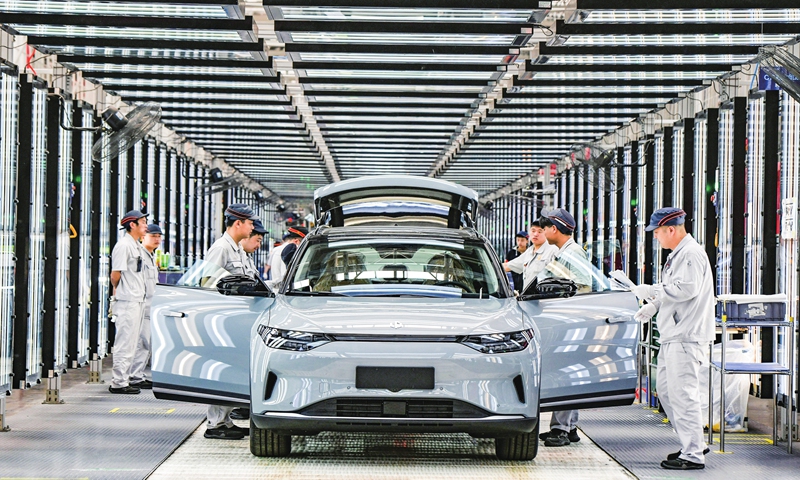
Workers complete assembling an electric vehicle (EV) at China's EV start-up Leapmotor in Jinhua, East China's Zhejiang Province on April 1, 2024. The smart EV factory delivered 14,567 new vehicles in March, a yearly increase of 136 percent. Photo: VCG
The US' reported plan to levy tariffs on imports from China's emerging industries is adding mistakes to mistakes, and its commerce department's decision to add 37 Chinese entities in the high-tech sector to a trade restriction list is abusing export control tools to suppress Chinese companies, which will prompt necessary countermeasures from China, a Chinese Foreign Ministry (FM) spokesperson warned on Friday, urging the US to stop politicizing trade matters and cracking down on Chinese companies on so-called national security grounds.
The latest moves showed that the US is stepping further down the path of clamping down on Chinese companies and "decoupling" with China, observers said, warning that there will be serious consequences.
The Biden administration is set to announce new China tariffs as soon as next Tuesday targeting strategic sectors including electric vehicles, batteries and solar equipment, Bloomberg reported on Thursday.
Also on Thursday, the US moved to tighten its technology crackdown on Chinese firms after the US commerce department added 37 Chinese entities to a trade restriction list, including some companies accused of involvement in the balloon incident in 2023, and also citing other reasons such as national security and links to Russia.
Observers said the moves revealed that the illogical and groundless smear campaign by the Western media and politicians hyping so-called Chinese "overcapacity" in green products is no more than a stepping stone for trade protectionist measures that had long been planned by the Biden administration, which lays bare the US' ulterior motive of cracking down on and stymieing China's development.
In response to reported US levying of more tariffs on Chinese electric vehicles and other green exports, FM spokesperson Lin Jian told a routine press briefing on Friday that the actions are "doubling the US' fault," noting that the Section 301 tariffs imposed by the former US administration on China have severely disrupted normal trade and economic exchanges between China and the US.
The WTO has already ruled those tariffs against WTO rules. Instead of ending those wrong practices, the US continues to politicize trade issues, abuse the so-called review process of Section 301 tariffs and plan tariff hikes.
The spokesperson urged the US to follow WTO rules, lift all additional tariffs on China and not to impose new ones.
Regarding the US entity list, Lin said that China strongly opposes US abuse of entity list and other export controls to go after Chinese companies.
"China and Russia have the right to normal economic and trade cooperation, and such cooperation should not come under external interference or constraint," Lin noted.
Lin urged the US to stop overstretching the concept of national security, stop politicizing trade and tech issues or using them as weapons, and stop abusing various types of sanctions lists to suppress Chinese companies.
China will continue to do what is necessary to defend the lawful rights and interests of Chinese companies, Lin said.
China will take necessary measures to firmly safeguard its own interests if the US still proceeds with its wrongdoings, China's Ministry of Commerce said on Friday in response to a military aid package the Biden administration signed in April, which contains multiple negative items targeting China.
Politicizing trade matters
Following US Secretary of State Antony Blinken's visit to China in April, there has been a marked uptick in the US' actions aimed at provoking China in trade and economic matters.
The US this week revoked licenses that allowed companies including US chipmakers Intel and Qualcomm to deliver chips used for laptops and handsets to Chinese tech giant Huawei. China's Ministry of Commerce on Thursday lambasted US export restrictions on the purely civilian use of chips as a "typical act of economic coercion," while US companies said that the move would negatively impact their earnings.
US Commerce Secretary Gina Raimondo on Wednesday warned that the US may take "extreme action" and seek to ban Chinese connected vehicles on national security grounds.
The US has also launched a probe into the Chinese maritime, logistics and shipbuilding industries.
Analysts warned that the US government has walked away from its pledge to avoid holding back China's economic growth and formulated new measures to crack down on Chinese companies and engage in "decoupling", which is hurting the positive atmosphere of engagement and dialogue that had developed in recent months.
Li Yong, a senior research fellow from the China Association of International Trade, told the Global Times on Friday the US' continued crackdown on China's high-tech sectors and emerging industries is not surprising and represents more of the US saying one thing but doing another.
"The US' continuing to contain and suppress China's development, to build and expand the so-called 'small yard, high fence,' and push toward decoupling is undermining the positive atmosphere of engagement and dialogue that had been built up in recent months with multiple high-level meetings taking place between the two sides," Li said.
Lü Xiang, research fellow at the Chinese Academy of Social Sciences, told the Global Times on Friday that the reports on a potential rollout of additional tariffs on Chinese green products showed that the Biden administration now believes there is an urgent need to resort to protectionist trade measures to shore up the US traditional industries and salvage some voters' support.
The Biden administration has apparently backpedaled on its pursuit of a green economy by giving in to pressure from workers' unions at traditional US automakers that predominantly make internal combustion engine vehicles, the expert said.
Biden and his aides are also trying to woo voters by playing tough on China, Lü said. "The punishment of entities accused of being involved in the balloon incident seems to tell its voters that the Biden administration does not easily forget things, while the crackdown on Chinese technology companies serves the purpose of looking tough on China."
However, Lü said any trade protectionist moves taken by the Biden administration are unlikely to halt the downward trend of the US economy, noting that the US government's investment and industrial policies have been so far proved ineffective in boosting overall investment in the US.
Global concerns
International and global business communities have raised grave concerns over the prospects of heightened tensions between the world's two biggest economies and their implications for global economic recovery.
IMF First Deputy Managing Director Gita Gopinath said on Tuesday that escalating tensions between the US and China have caused global ripples, and countries are reevaluating their trading and investment partners based on economic and national security concerns, leaving the world divided into three blocs.
Many in the corporate sector have also cast doubt over the West's hyping of Chinese "overcapacity" in green exports.
"With green technologies, China is making a great contribution to the world because we need to go very fast to solar and go very fast to electric mobility. China is helping to achieve that both in China and the world," Frank Hammes, global CEO of Swiss air quality technology company IQAir, told the Global Times in an interview on Friday.
China is well positioned in important sectors that facilitate a global transition to a greener, more sustainable power generation and transport, he said.
China, which had kept a restrained posture in response to US provocations, could strike back when it deems necessary in this escalation of trade tensions amid the US' headstrong trade protectionist moves, analysts warned.
Despite certain US politicians pushing for decoupling against Chinese exports, bilateral trade has shown signs of steady growth, with total China-US trade expanding 1.1 percent year-on-year to 1.47 trillion yuan ($203.42 billion) in yuan-denominated terms in the first four months, reversing a 0.7 percent contraction in the first three months, customs data showed on Thursday.



